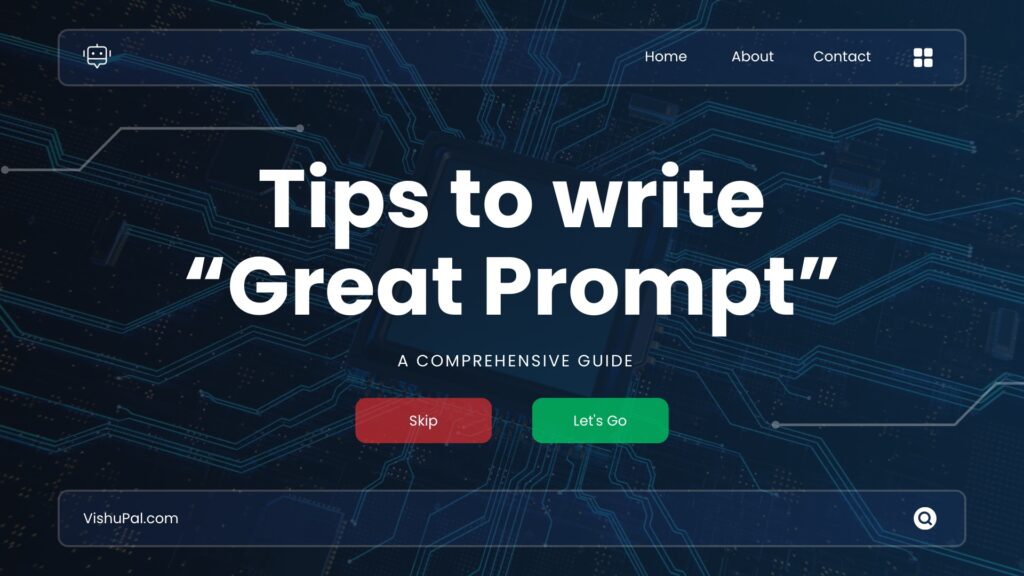Tips to Write a Great Prompt- In the age of artificial intelligence and machine learning, writing effective prompts is crucial for generating high-quality responses from AI models like ChatGPT. Whether you’re a developer, content creator, or business professional, mastering the art of prompt writing can significantly enhance the quality of your interactions with AI. Here are some essential tips to help you write a great prompt.
1. Be Clear and Specific
Clarity is key when it comes to prompt writing. A clear and specific prompt reduces the likelihood of receiving irrelevant or vague responses. Ensure your prompt leaves no room for ambiguity.
Example:
– Vague: “Tell me about dogs.”
– Specific: “What are the most popular dog breeds in the United States, and what are their unique characteristics?”
2. Define the Context
Providing context helps the AI understand the background and framework of your query. This can be particularly useful when the topic is complex or multifaceted.
Example:
– Without Context:”Explain blockchain.”
– With Context: “Explain blockchain technology as it applies to financial transactions.”
3. Use Proper Grammar and Punctuation
Correct grammar and punctuation are essential for clear communication. Poorly structured prompts can confuse the AI, leading to less accurate responses.
Example:
– Incorrect: “whats the benefits of using solar energy”
– Correct: “What are the benefits of using solar energy?”
4. Ask Open-Ended Questions
Open-ended questions encourage detailed responses and stimulate informative answers. These questions often begin with “how,” “why,” “what,” or “describe.”
Example:
– Closed-Ended: “Is Python a programming language?”
– Open-Ended: “What are the advantages of using Python as a programming language?”
5. Limit the Scope
While being specific, it’s also important to limit the scope of your prompt to avoid overwhelming the AI with too broad a topic. Narrowing down your query can lead to more focused and useful answers.
Example:
– Broad: “Tell me about the history of the world.”
– Narrow: “Tell me about the key events in the history of the Roman Empire.”
6. Use Examples
Including examples in your prompt can guide the AI towards the type of response you are expecting. Examples provide a benchmark for the AI to follow.
Example:
– Without Example: “Explain how to write a resume.”
– With Example:”Explain how to write a resume, such as highlighting your education, work experience, and key skills.”
7. Encourage Detailed Responses
Encouraging detailed responses can yield more comprehensive information. You can prompt this by explicitly asking for a detailed explanation or by breaking down the question into parts.
Example:
– General: “What are renewable energy sources?”
– Detailed: “What are the different types of renewable energy sources, and how does each one generate power?”
8. Avoid Leading Questions
Leading questions can bias the AI’s response. Instead, ask neutral questions to get a more balanced answer.
Example:
– Leading: “Why is electric cars better than gasoline cars?”
– Neutral: “What are the pros and cons of electric cars compared to gasoline cars?”
9. Review and Revise
Before finalizing your prompt, review and revise it to ensure clarity and precision. Consider potential misinterpretations and refine the prompt accordingly.
Example:
– First Draft: “Tell me about climate change effects.”
– Revised: “What are the major effects of climate change on the environment and human health?”
10. Experiment and Learn
Prompt writing is as much an art as it is a science. Don’t be afraid to experiment with different phrasing and structures to see what works best. Over time, you’ll develop a sense of how to craft effective prompts that yield the best responses.
Conclusion
Writing great prompts is essential for leveraging the full potential of AI tools like ChatGPT. By being clear, specific, and contextually rich, you can significantly improve the quality of the responses you receive. Use these tips to refine your prompt-writing skills and enhance your interactions with AI, ensuring that you get the most accurate and helpful information possible.
For more tips and insights on effective AI usage, stay tuned to our blog and explore other articles that can help you optimize your AI interactions.




